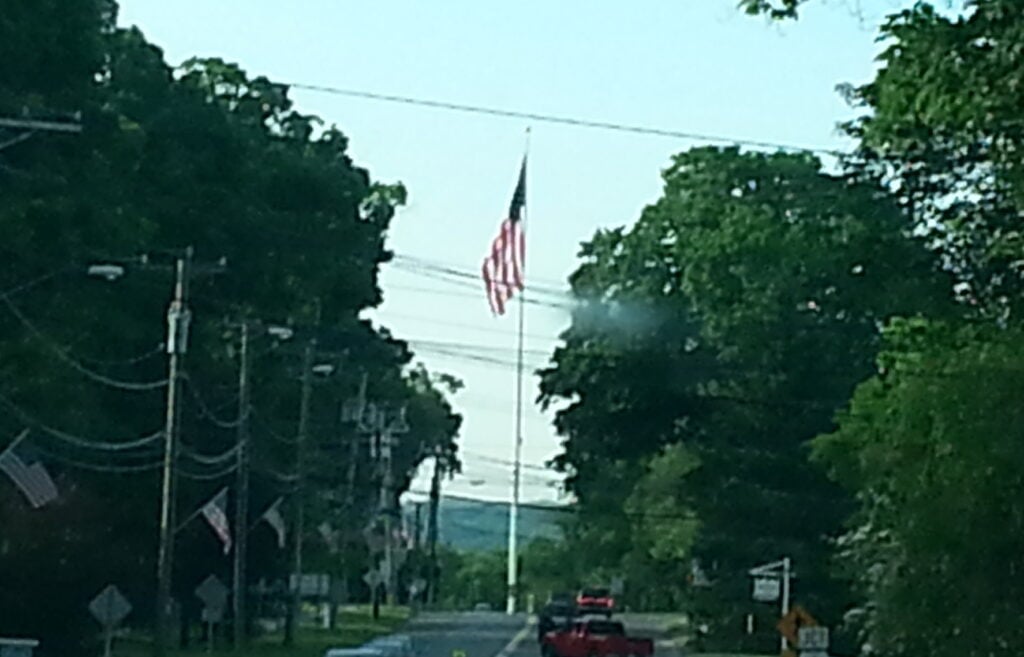
What Exactly Does It Stand For?
Foreign policy, a nation’s collective conduct, best attains its interests if it correlates means to ends. To make the correlation, even to know its ends, a nation needs to know its identity.
Attaining this knowledge raises great complexities. On May 8, a panel at the American Enterprise Institute on American nationalism wrestled with them, hard. Various views, all conservative, saw nationality residing, in varying proportions and senses, in the Constitution, in the Declaration of Independence, in some combination of British stock and the Declaration’s claims, or in the practice of patriotism.
America’s founding on classic Liberal principles actually poses a rather odd question. Washington Post columnist Megan McArdle, in a reflection on her encounter with Irish cultural preservationists, comes to muse whether Liberalism’s
“cosmopolitan viewpoint … is itself exactly the sort of exclusivist project that its proponents supposedly reject. It can see only one right way to live your life, which is mobile, socialized to the values of the educated class and best adapted to the cities where most of its cosmopolitan proponents just happen to live.”
McArdle is American, but also identifies as transnational. Her visit left her torn. Her politics make her one of the “people from nowhere,” and she fears that cultural pride leads to exclusion. But she also found an elemental satisfaction in back-country Ireland as she learned now her “bones took shape.” She, rather like the panel at AEI, now struggles with the relationship between organic identity and Liberalism. America needs to work through this, as a nation.
Classic Liberal principles are British in origin, which has unexpected implications. Britons can take the principles as organic heritage, much as McArdle’s Irish preservationists do the Irish language. Liberalism could be taken as an Anglo ideology. But Britons could also determine, should they choose, that other strains of their culture are more British. Locke and Hume, Adam Smith and Mill were not the only British philosophers. Burke, even Filmer, could theoretically gain a revival. The Brexit movement can invoke mythic cultural roots.
To quote Gordon Wood, in his “The Idea of America,” “to be an American is not to be someone … but to believe in something.” The American nation declared itself in its divorce of its cultural motherland. The British signers of the Declaration of Independence renounced Britain in the name of a principle: of unalienable rights universally endowed and government only legitimized to secure those rights. The “one people” separating from the other, “we” for whom the signers spoke, are defined in the Declaration by precisely this belief, and, on examination, nothing else. Americans cannot renounce the Declaration’s abstract principles.
Yet “homo liberalus” looks more and more like a someone to be than a something to believe. The Declaration’s creed does not prescribe any “ism,” not even “Liberalism.” It defers to each person to choose their own lights. If my pursuit of happiness leads me to invest my identity in some tribe, even with illiberal internal tenets, the creed stands silent. It leaves each of us to work things out for ourselves. I might draw on my traditional church or ethnic heritage; I might invent my own. So long as I respect the rights of others – and government does impose restraints to secure them – it falls to me.
Even if I follow a traditional faith, it is not pre-ordained by birth, not received from the divine. The American can opt out. This is choice. We may not all be self-creators or self-inventors, but we cannot avoid being self-choosers. But choice is the act of a mere mortal. The Declaration’s deference to my choice imposes a burden even as it liberates. My identity belongs to me alone, without support of church or king. It is mine as it rarely has been in human history – my homestead, maybe a village carved out with others who choose as I do, in a social wilderness.
If the nation’s founding creed defers to each of us in our choices, what, exactly, is an American? Our abstract creed and the abstract flag symbolizing our State yield no automatic answers. Yes, it is “we” who hold our truths. That also means it is each of us wrestling, like McArdle, to reconcile national principle and personal identity. This wrestling befits a nation of immigrants – including even the involuntary — and includes the oppressed as they gain franchise. It also fits the founding tenets; in our liberty we all wrestle to define and pursue our happiness. Which wrestlers can be citizens is a separate, though vexing question: shaping rules of inclusion will continue to absorb great energy. But the principle puts enduring common ground under the debate.
How should a nation founded on abstract principle conduct itself in the world? Do our self-evident truths, and our national basis in them, contradict the legitimacy of nations based on race, religion, language, heritage, or soil? Can America avoid ideological conflict with traditional regimes? As with citizenship, politics will set the actual actions. The essential point for America is to ensure that debate, and hence the outcomes, refer first to America’s odd (exceptional?) national identity, resting on our abstract founding creed.